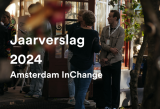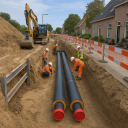‘Technology is not neutral. We're inside of what we make, and it's inside of us. We're living in a world of connections — and it matters which ones get made and unmade.’ — Donna Haraway, Cyborg Manifesto
With this powerful quote from feminist science philosopher Donna Haraway, Sander van der Waal opened the knowledge session at the 27th Knowledge and Demo Day. What if we no longer viewed technology solely through the lens of big corporations but instead from a broader societal perspective? This question took centre stage in the session, where we, together with Sander, reflected on the role of technology in our society.
From pioneering to big tech
The internet originally started as a decentralised network where everyone could connect with one another. The Digital City, a freenet initiative by cultural centre De Balie and Hack-Tic, was one of the first projects to experiment with data sharing in Amsterdam. It was the first online internet community to come to existence. However, in the early 2000s, big tech gradually took control of the internet. What was once a free and open platform transformed into a space where a handful of companies dictated the rules. Shoshana Zuboff wrote about this in her book The Age of Surveillance Capitalism. “Forget the cliché that if it’s free ‘you are the product’. You are not the product. You are the abandoned carcass,” Zuboff states in her book.
Today, we navigate a digital landscape shaped by platforms like Facebook and Google, which dictate how we communicate. We’re all familiar with the well-known image from Donald Trump's swearing-in ceremony, where a noticeable shift in protocol placed top CEOs in the front row — traditionally reserved for the President’s family, key political figures, and former Presidents. The internet is now dominated by a handful of conglomerates, which are increasingly influencing decision-making in the United States.
According to Sander, the choice is limited: give up your privacy or remain outside the digital society. But how does this align with European legislation? More importantly, how does this impact our mental health? Recent figures from Amsterdam show that 36 per cent of young people experience mental health issues, with social media cited as one of the contributing factors.
What happens to our data?
Sander illustrated this using a graph on the screen, showing how we unknowingly transmit our personal data hundreds of times each day to unknown entities, which then use it to target us with personalised ads. In the Netherlands, this happens an average of 380 times per day — a relatively low number compared to U.S. states. Colorado leads the way with 987 instances per day. This continues despite the implementation of the GDPR in Europe, which was meant to curb such practices. Lawsuits against data misuse are ongoing, but in the meantime, these processes persist — or even expand.
According to Sander, this highlights a deeper issue: technology is not neutral. Human biases are embedded in it, and AI only amplifies them. Artificial intelligence is already being used in job interviews and to shape personal preferences. This also raises another question: how sustainable is our use of AI? The art project Anatomy of an AI System by Kate Crawford and Vladan Joler vividly illustrates what happens behind the scenes when we ask an AI a question — from the extraction of raw materials to the energy required to generate a response.
Is there another way?
Waag Futurelab champions a new technological foundation. One that prioritizes people over profit. In collaboration with various organizations, they have developed a manifesto (PublicSpaces) that defines how technology should serve society, not the other way around. Here are its core values:
- Accountable
- User centric
- Transparant
- Open
- Sovereign
Sander also highlights alternatives such as GPT-NL (an open AI model from the Netherlands), Fairbnb.coop (a fairer alternative to Airbnb), and Fairphone, which offers a more sustainable smartphone option that breaks away from the traditional tech industry. These applications work differently from Big Tech, focusing on giving users more control over technology.
But how do we transition to more transparent, privacy-friendly, and sustainable technology? A thought-provoking question from the audience: Can we still go back? One attendee admitted they don’t use Signal because all their friends are still on WhatsApp, sparking a discussion on ethics and peer pressure. Should change start at the individual level, or does it require collective action?
Seeking digital independence
The dependence on American tech companies is increasingly being questioned. A recent ICC report in The Guardian warned of the influence of major US corporations on geopolitical institutions. Meanwhile, Dutch media have raised concerns about how the country can become independent of big tech. Professors from Radboud University have also recently called for action.
This all leads to Sander’s crucial conclusion: the internet belongs to all of us. As a society, we decide what our digital future looks like. Under the hashtag #MakeSocialsSocialAgain, a campaign led by Bits of Freedom, DeGoedeZaak, Noorderlicht, PublicSpaces, and Waag Futurelab is now urging public organisations to take the first step by adopting alternatives to big tech social media platforms. These platforms are built on public values such as transparency, privacy, and sustainability — and there are plenty of alternatives available. See the screenshot from Sander’s presentation here.
We’re curious: do you already use alternative social media platforms? Or maybe you have some great other recommendations? Leave a comment below, and let’s share our tips with each other.
















